Help Your Goats Cope With Winter
Get tips on how tips on on how to help your goats cope with winter so they stay healthy even when it’s frigid cold out. When you live in Northwestern Pennsylvania, the winters can be pretty brutal. I am talking -25-degree wind chill brutal.
Keeping your animals warm in those frigid temps can be tricky, but it doesn’t have to be. Use these tips on how to raise dairy goats that are healthy and happy even when the weather is cold and wet outside.
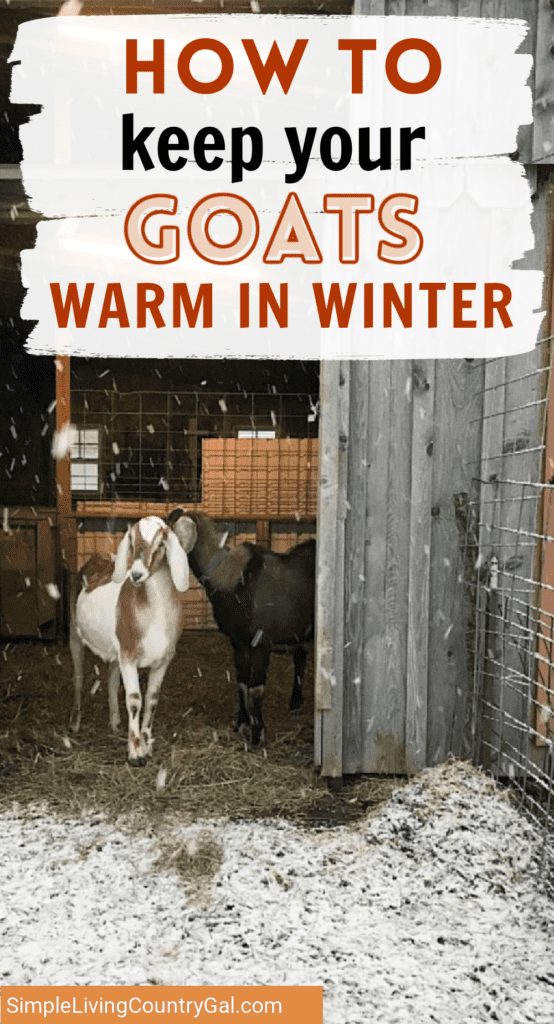
When I first started raising animals, I used to worry about them in the cold weather, so much so that I made a costly mistake during my first winter. I thought my goats could not handle the frigid temps where we lived, so what did I do? Well, I loaded my barn with heat lamps.
And I thought I was doing a great thing for my animals by heating the barn for them. All those lamps made the barn cozy and warm, and each goat stall had a constant heat source. But what I was doing was actually the opposite of a good thing.
By adding in all that heat I was not trusting my animals to handle the cold weather on their own. I did not think they could build up their stamina naturally with the cooling temperatures.
does a goat’s fur protect from cold temperatures?
When the temperatures begin to cool down in the fall, all livestock will adapt gradually by growing a thick undercoat of cashmere. As temperatures continue to drop, their coats will continue to thicken until they are covered with a cozy layer of protection.
This means when winter does finally hit, their bodies are conditioned enough to handle the worst.
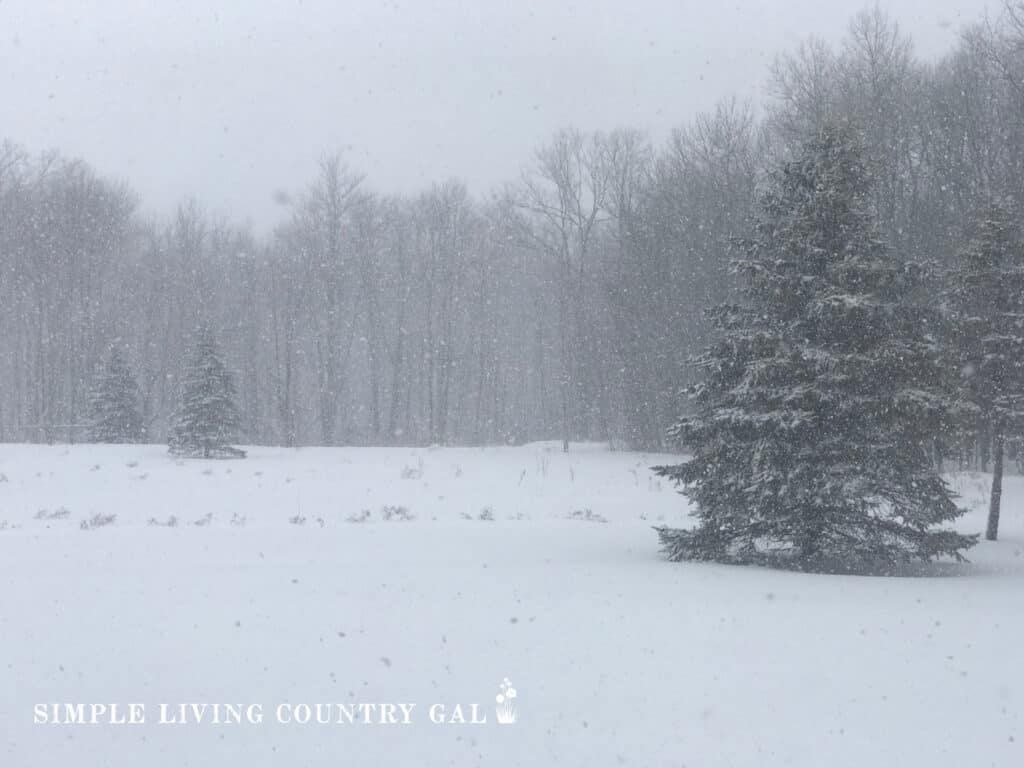
By adding in artificial heat as I did all those years back, my goats instinctually thought the weather was warming up and they actually began to shed their fur.
Yes, my goats were shedding…IN JANUARY!
The artificial warmth in the barn told their bodies that they no longer needed that thick, full coat they were starting to grow. That meant they did not have adequate fur to keep them warm throughout the winter without relying on the lamps. Needless to say, my goats soon found that if they did not stay close to the heat lamps, they would get cold quickly.
I also found that my goats would not go outside in the winter that year either. They just couldn’t handle the cold temps, and even though they craved the sunshine, they could not be out in it for longer than a few minutes.
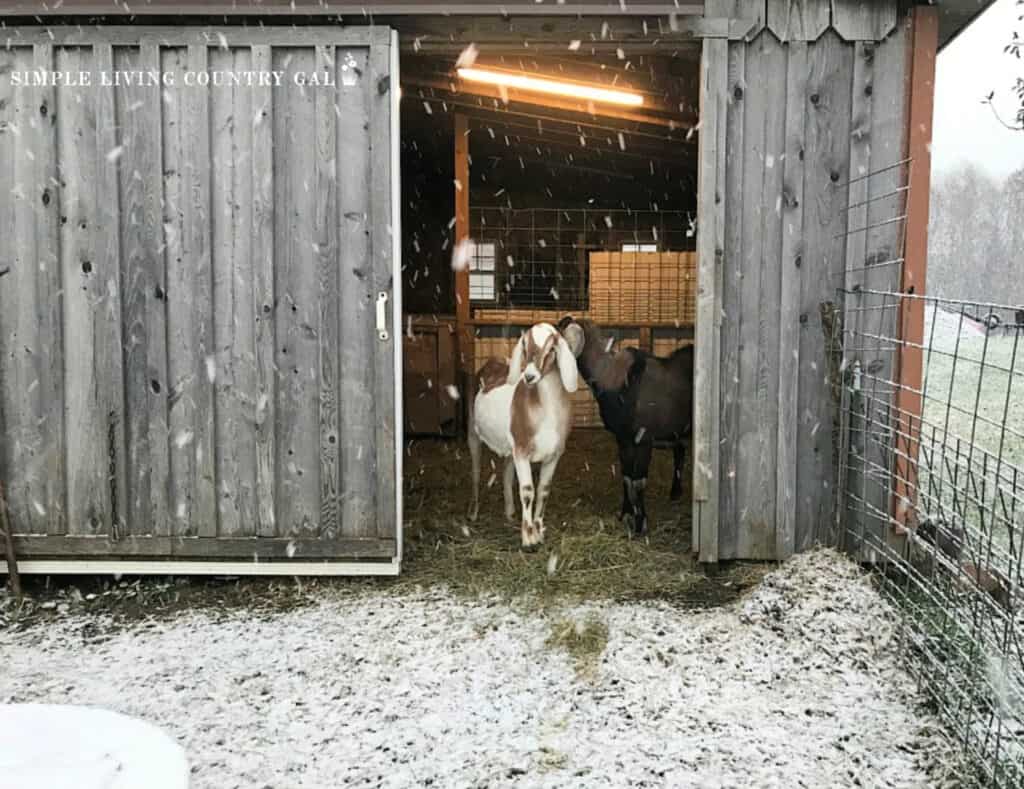
SLCG Pro Tip: Heat lamps are dangerous and are one of the top causes of barn fires in the winter. I almost caught our barn on fire with our heat lamps that first winter.
That was when I learned just how dangerous heat lamps can be. After several barn fires that year in our area, all from using heat lamps, I realized the risk was too great.
I have since learned that heat lamps are used only with newborns and only when absolutely necessary. This is something we will talk about later on in this article.
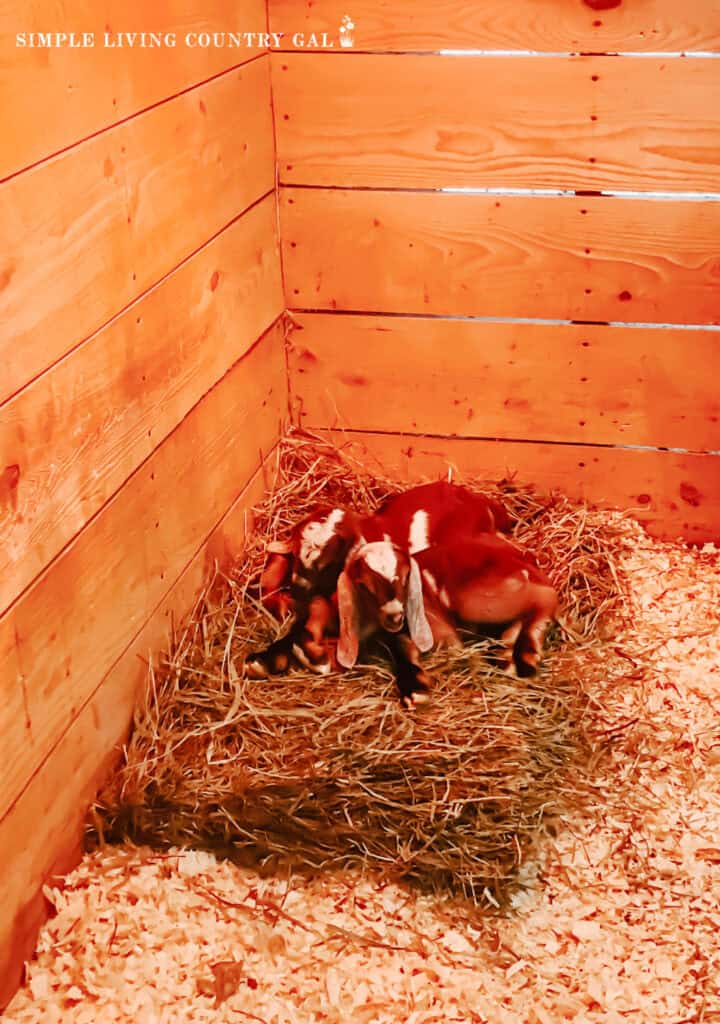
If you are still worried about your goats and how well they will handle the cold temps where you live, no worries. You can do a few things to help keep your animals warm in the winter.
HOW TO HELP YOUR GOATS COPE WITH WINTER.
This list of tips are all things I have used or have tried myself, and they really do help our animals stay healthy and happy throughout the entire winter.
Remember, if you can handle the cold when bundled up, then your goats can as well with their own personally grown fur coat.
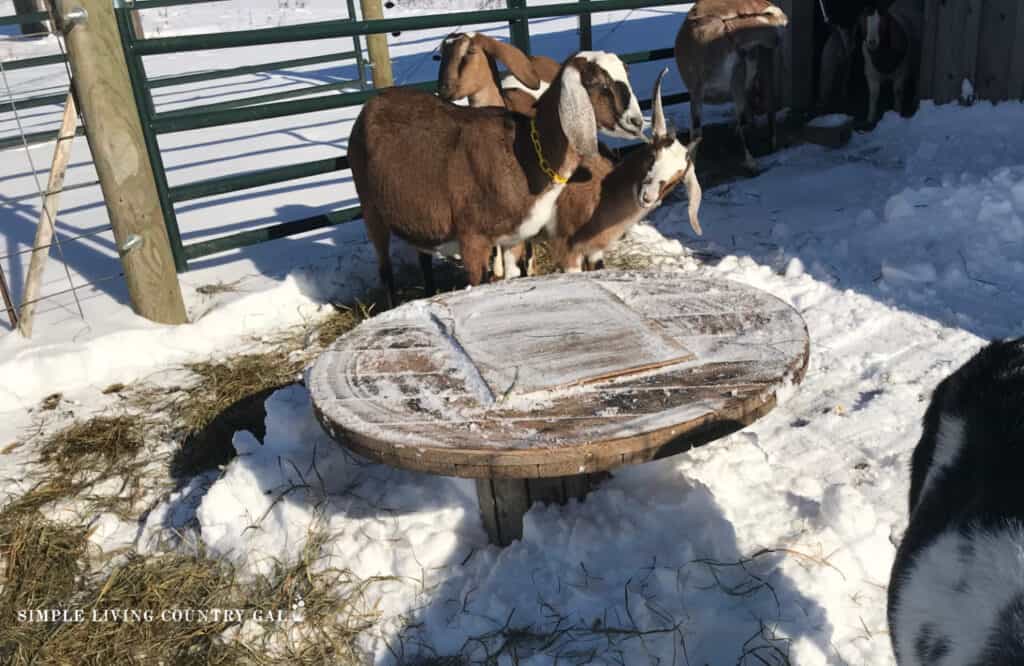
TIP #1. good Shelter
If you do not have a barn or some shelter that your goats can use to get out of the weather, you will want to start there.
Depending on where you live and how bad your winters get will determine if you need a full barn or just a lean-to. A lean-to is a three-sided structure that will do well to protect your animals from rain and some snow.
The trick is to have the open side facing away from the natural wind currents in your area.
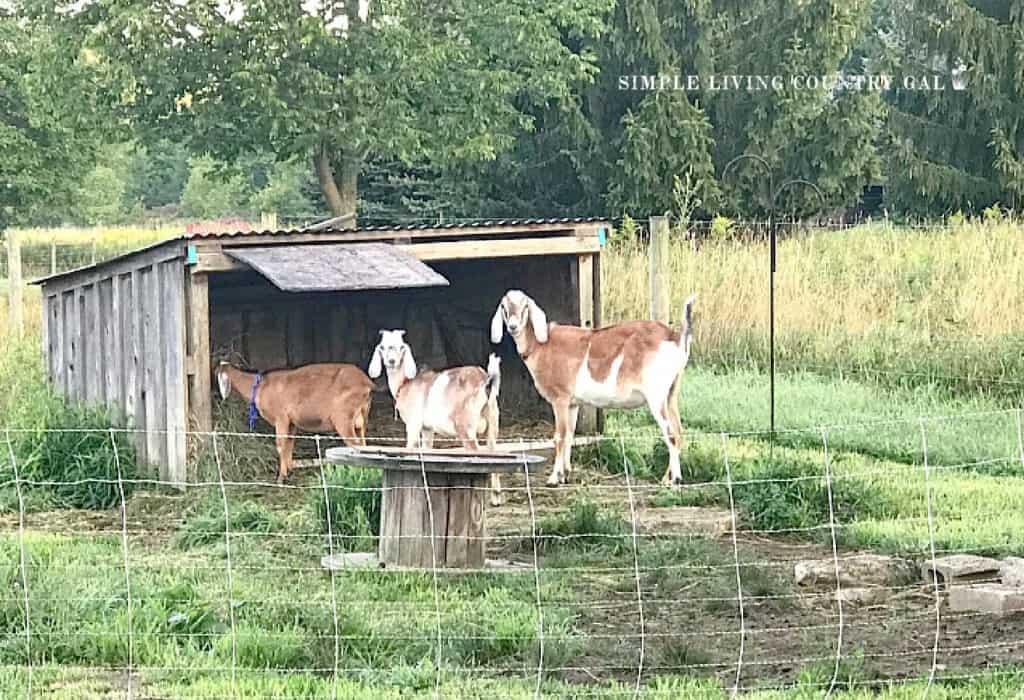
Goats are not like horses or cows; they need to have some sort of protection that will allow them to get out of the rain and snow. Before the cold weather hits, make sure you are ready with a shelter that is enclosed on at least 3 sides. You will also want to have a temporary way to close off the main opening when the weather really calls for it.
SLCG Pro Tip: To close off that 4th side of a lean-to, you can use a tarp or even a piece of scrap wood for protection from heavy winds to help keep your goats warm. Use wood strips to secure the tarp to the top of the opening.
This will keep it from tearing in the cold winds. Be sure to secure the bottom as well, but just part of it. This will give an opening on one side for some air flow and for your goats to go in and out if they want to.
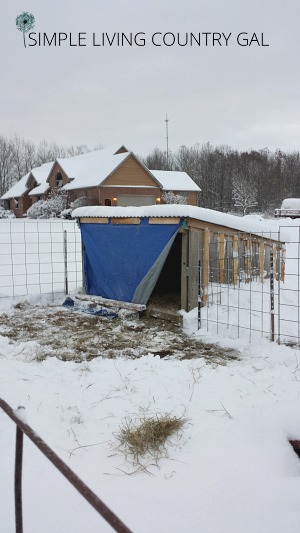
Floop tips: You also want to be sure your shelter has a floor to keep your goats up off the frigid ground. You can either have wood or put a thick layer of bedding. The ground can sometimes be colder than the air.
Insulation Tips: Use bedding such as straw or wood shavings as insulation for your animals. This will help them sleep more comfortably at night. A thick layer of straw is a great way to warm up the cold ground. You can also put bales of straw inside, giving them a platform on which to lie down.
A solid lean-to with enclosed walls and a floor that is packed with extra bedding is surprisingly warm even in the cold winter.
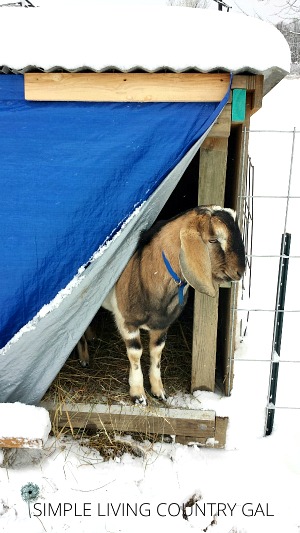
Ensure you have good airflow to prevent pneumonia or other lung issues from occurring in your animals. This goes for all shelters including barns, chicken coops, and other shelters. Pneumonia is something that can happen if you do not have fresh air coming in for your animals to breathe. For this reason, I really like to use tarps to help stop drafts.
Tarps are easy to adjust, allow the airflow needed for your goats, and keep out the wind better than you may imagine. You will need to be sure you purchase heavy-duty tarps as these tend to hold up better in even the heaviest of winds.
TIP #2. DEEP LITTER METHOD
Nothing chills an animal more quickly than the cold ground in the winter. The best way I have found to combat this, other than building a raised wooden bed, is to use the deep litter method.
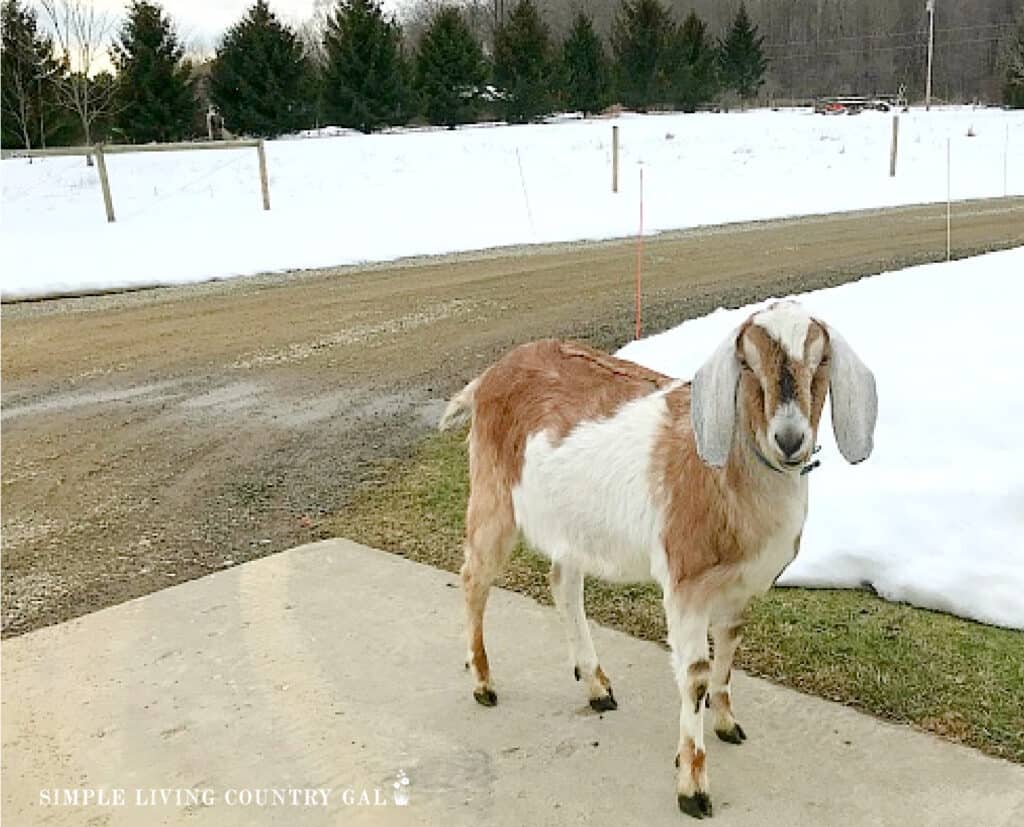
WHAT IS THE DEEP LITTER METHOD?
The deep litter method is when you leave the bedding where it is, allowing it to “deepen” all winter long. This helps the hay and bedding to build up to a nice thick layer, adding a barrier between the cold ground and your livestock. This layer works great as insulation to keep your goats warm.
Read: How To Use The Deep Litter Method To Keep Your Animals Warm In Winter
Every week, you will want to add a layer of fresh bedding to keep the shelter from smelling sour. You can use straw, wood shavings, or sawdust. I would refrain from using hay for bedding as your goats may nibble on it while lying down. This is not ideal as the bedding is usually soiled and can cause your goats to get sick or cause worms to break out.
Don’t worry about things getting too smelly. Luckily, goat manure has very little odor, and most of the bedding will not smell. It is important to note that goat urine does smell. To help, whenever you feed or water your goats, take the time to inspect the odor with your nose. If you smell ammonia, you will want to neutralize that smell as it can lead to lung issues if your animals breathe it in for an extended period of time.
Baking soda is an effective odor neutralizer and deodorizer. While your animals are out of the shelter, you can sprinkle some down to help control the odor.
SLCG Pro Tip: To keep the bedding from getting overly soiled, you can spot clean daily. Once a day, remove some of the bad areas with a manure rake. This one chore can make a big difference in the state of your pens.
TIP #3. BUILD A TEMPORARY RAISED BED
If you find your goats standing to sleep, this usually hints that the ground is way too cold. Every year, I build raised goat beds out of discarded pallets to make things a bit more comfortable and to get them up off the ground. You can see my step-by-step tutorial here: How to Build a Raised Goat Bed.
The goal is simple: find a way to get your goats off the ground to help cope with winter more comfortably.
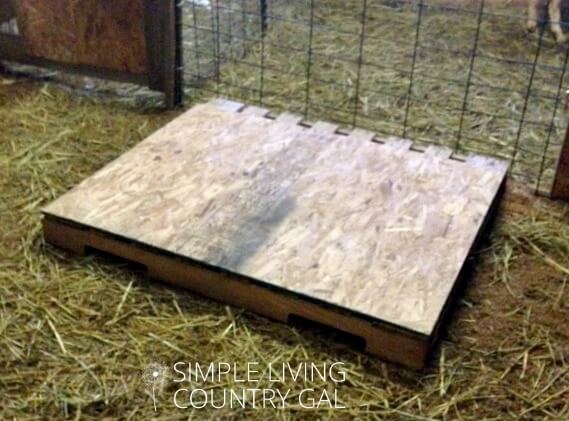
TIP #4. GIVE PLENTY OF FRESH, WARM WATER
When temperatures are really cold, your animal’s water can freeze quickly, preventing them from drinking. Fresh water at all times is the key to healthy animals, and even though it’s cold water, it is still crucial to your animal’s health. If your goats are not drinking as much as you would like, you can offer warm water first thing in the morning.
Doing this first thing in the morning will help to encourage your goats to drink. Surprisingly, goats love the warm water and will usually come over just as soon as they see me pouring it. You can also use a heated waterer if you have electricity in your goat barn, or you can bring out jugs of hot water from the house as I do. By the time you pour it, the water will cool down a bit so your goats can start drinking.
304 Stainless Steel Automatic Livestock Waterer with Float Valve and 39 inch Water Hose(one end 3/4”), Automatic Animal Water Bowl for Dogs,Horse,Calf,Chicken,Goat, Livestock Horse Waterer Dispenser

More Water Tips:
- Put a splash of organic apple cider vinegar for an added boost. Most animals love the taste, and the flavor of the ACV will help them to drink.
- Add black strap molasses to the water. Goats LOVE molasses and this can encourage them to drink in a pinch. Do not do this too often, save it for times when you need them to hydrate.
Like humans, animals prefer fresh, clean water. If you find your animals are not drinking, try dumping out the water and replacing it with a fresh supply. Usually, this is enough to do the trick and get your goats drinking again.
TIP #5. GIVE PLENTY OF HAY
One thing nice about goats is they have a natural way to warm up from the inside out. When your goats eat hay, they get their rumens working, and that acts as a natural furnace, warming them up quickly and efficiently.
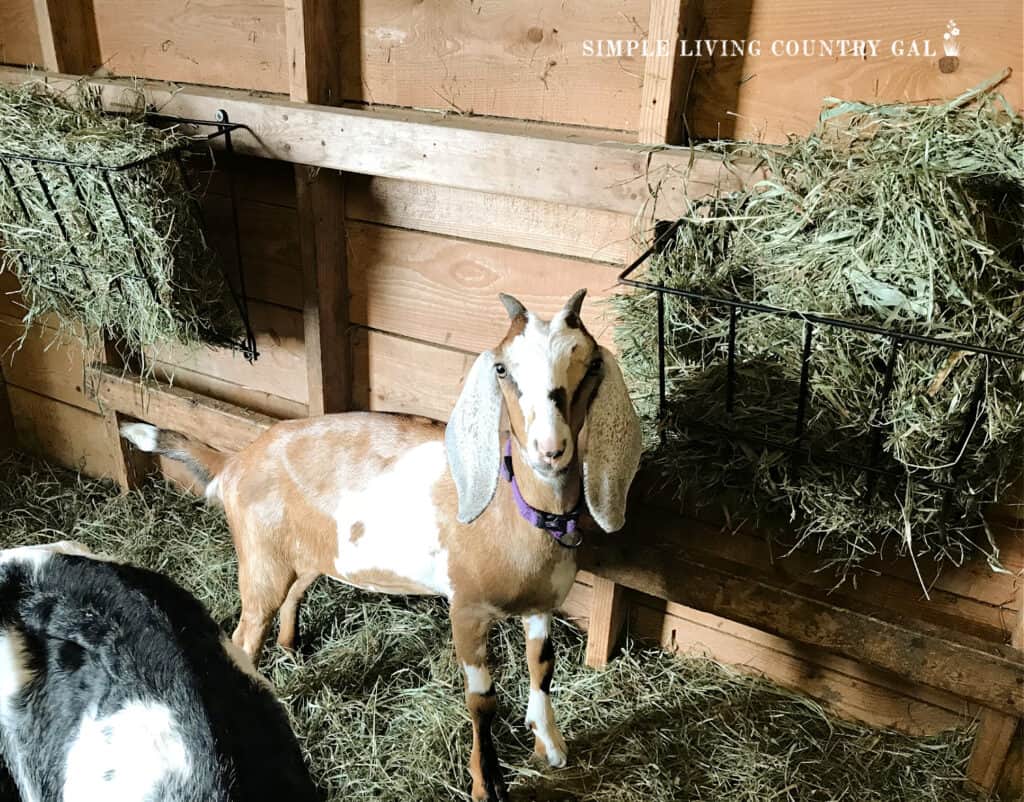
To help your goats stay warm in the winter longer, use this tip. Rather than giving your goats a huge helping of hay once a day, you can try giving them 2-3 smaller helpings throughout the day instead. The fresh supply will cause your curious goats to come over, and usually, they will begin eating right away.
This will do two things.
- Get your goats up and moving around and, in turn, get that blood flowing.
- Get them munching on fresh, good, quality hay, which will get their rumens working, igniting that internal furnace.
The main goal with your goats is to be sure the hay is good quality so they will want to eat it. Alfalfa is the best hay you can give your goats, but not all areas grow it. This means you will need to find the best cut native to your area and supplement it if needed.
For our goats, we feed Chaffhaye. This is fermented alfalfa hay that is concentrated, so not much is needed to benefit your goats. Chaffhaye can be found by a supplier if there is one in your area.
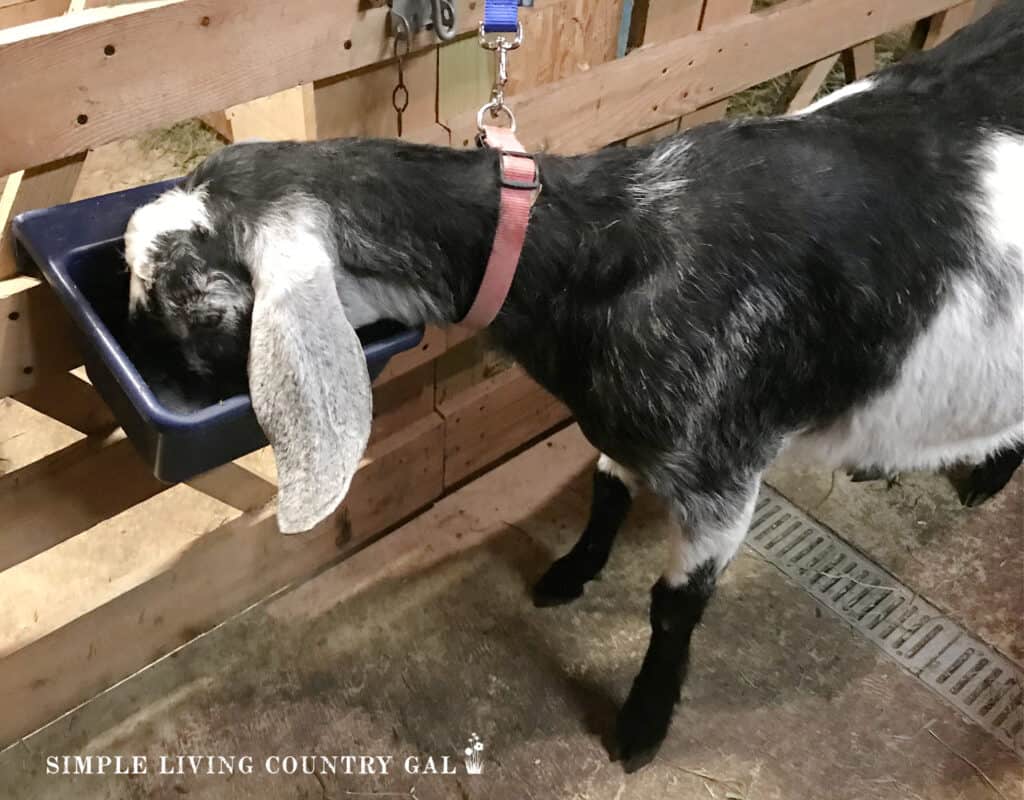
Just know this is an expensive option, so only invest in it if your budget can afford it. Your goats will do just fine without the addition of alfalfa. Another option is to increase the value of the local hay you are feeding instead.
This could be as simple as upgrading to 2nd or 3rd cuts if you can find them in your area. If you are not sure where to find these cuts? Call local farmers and ask them. More often than not, they will help you locate the cuts and quality you are looking for.
Read: Hay Feeder Options For Goats
TIP #6. LET THE SUNSHINE IN!
There is something to be said of the warm sunshine, even on a 20-degree day. When the sun is hot and strong, I like to open up the barn and let the goats do a little sunbathing, and they love it! Remember, their coats are thick and warm, and most goats crave the sunshine, especially in the winter. Give them some time in the sun and watch their spirits improve.
SLCG PRO TIP: Please be aware that only your healthy older goats should do this; younger kids or weak goats should be kept out of the cold at all costs. Also only to do this when the sun is warm, and there is no wind or precipitation.
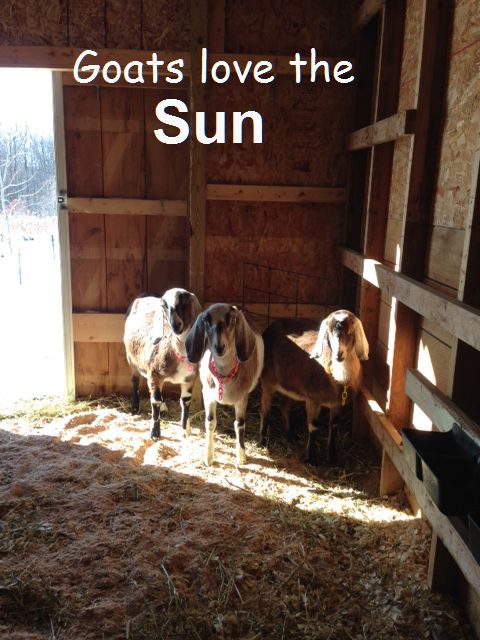
TIP #7. GET YOUR GOATS MOVING.
Goats love to play, and luckily, I love to play with my goats. Tag is their favorite…especially when I am the target. 🙂 I will run around with my goats to get the blood moving, and before you know it, they are all playing and running and warming up.
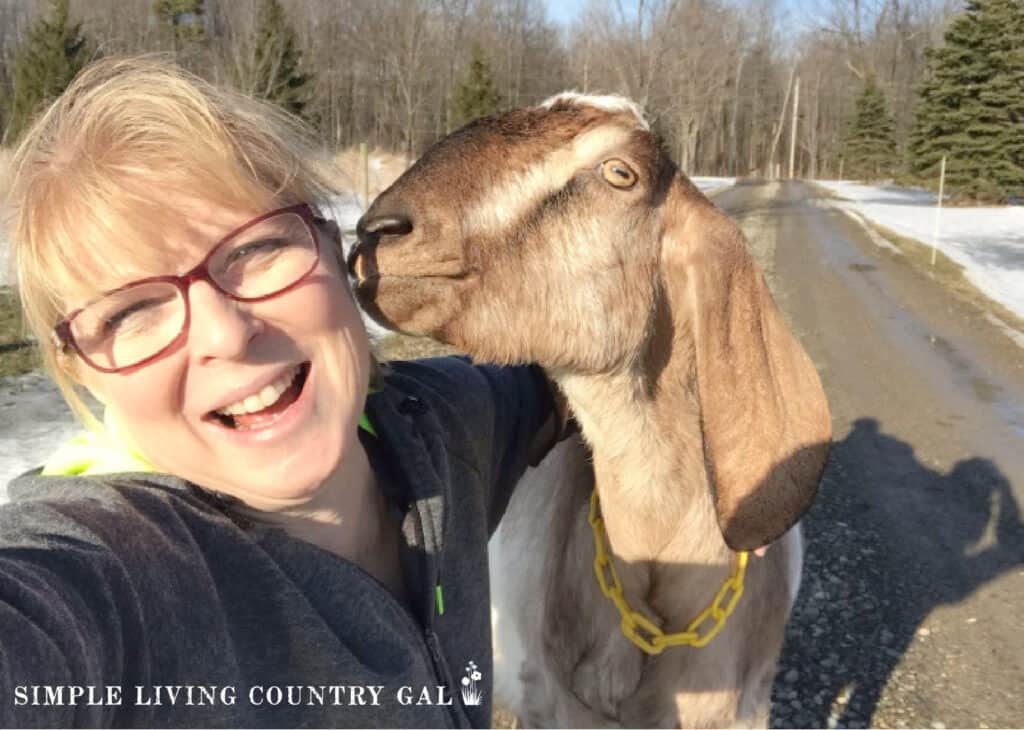
If you have no time to play, at the very least, set up your pens in a triangle to force everyone to move and to help keep animals warm. A triangle pen setup means having the water at one point, your goat’s minerals at another point, and their hay at the third point. This will keep your animals moving without them even realizing it.
TIP #8. DON’T WORRY ABOUT THE SHIVERS
That first winter, I used to panic whenever I saw my goats shivering. I thought that meant they were cold, and I needed to help them warm up. An old farmer friend of mine told me that shivering was their way of warming up, and that was actually a good thing. When you have a goat that is cold and is not shivering, this is something you do need to worry about.
Dairy Goat Milking Guide+Bundle

WHAT NOT TO DO IN THE WINTER?
Let’s recap:
- Do not use heat lamps unless you have very young newborn kids. Instead, allow your goats to adapt to the colder temps naturally and grow a thick, downy coat.
- Do not put coats or other coverings on your goats. This will matt the hair down and not allow it to grow and thicken, so it can insulate your goats, helping to keep them warm.
- Do not ignore a change in your goats. If they are not eating, drinking, or moving as they normally do, this is a sign that something is up. Take the cues you are given and investigate when needed.
- Touch your goats. Pet them, feel them. A thick coat can mask quite a few issues. Pet your goats every time they eat and drink so you can recognize their body condition and again be alerted when something is off.
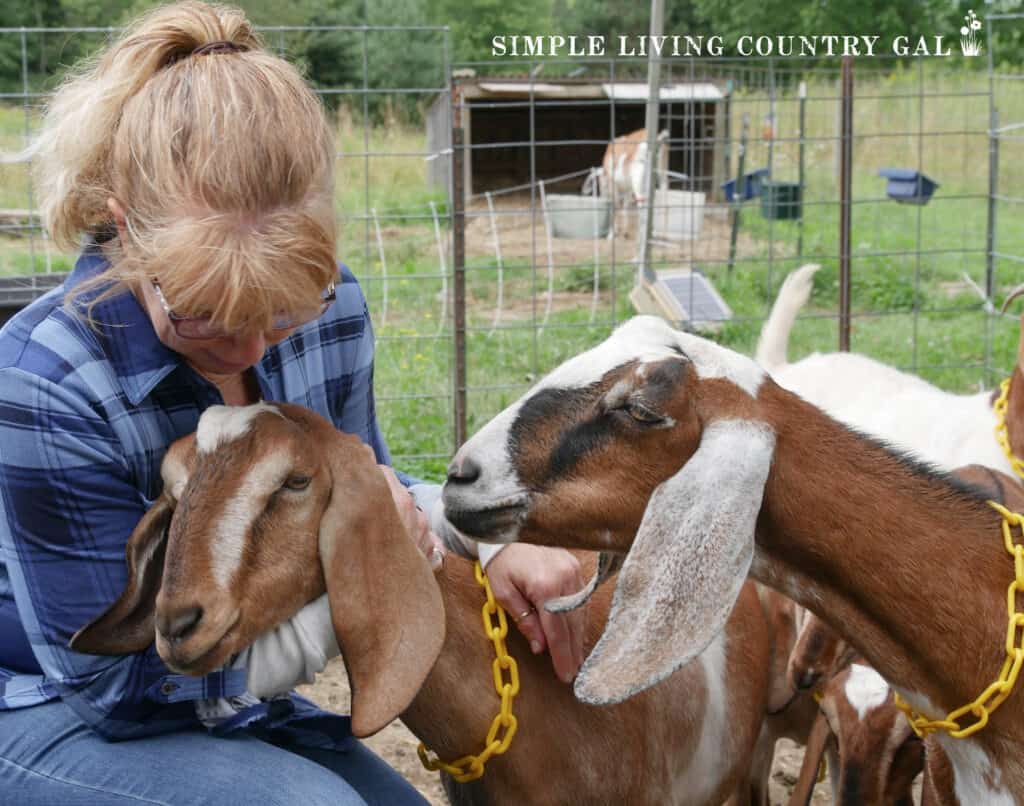
Disclaimer: In accordance with FDA guidelines, the information and products offered on this website are not intended to diagnose, treat, cure, or prevent any disease. I am not a medical professional. Before administering any medications to your animals please contact a veterinarian first.
UPDATED: MORE COLD CARE TIPS.
I received a question from a reader that I wanted to share in the hopes that it will help you if you are dealing with the same issues with your goat herd.
What can you do if your goats are shivering off and on during a cold snap?
The trick with any animal is to allow them to acclimate to weather changes slowly. This will ensure that their body is better prepared to endure colder temperatures more naturally. For most goats, this is done by growing a thick undercoat of fur called cashmere.
Best Goat Care Tools:
Tahoe Tack Stall Fork with Shaft and Extra Fork Head



Goats are able to grow this undercoat during the fall as the weather cools down. For us, that means always keeping barn doors open (when the weather allows), giving our herd that chance to prepare and adapt. With that being said, there are a few breeds that tend to do better in colder temps. Those breeds are Nubians, Nigerian dwarfs, and some Swiss breeds.
If your goats are shivering and you are concerned that there may be something else going on, here is a quick list to refer to as you begin taking a closer look at your animals.
Additional Tips:
There are a few instances that you will want to be aware of so you can intervene if necessary. Things to watch for if your goats are excessively shivering in cold temperatures.
EATING
How are your goats eating? Is their appetite normal? If temperatures are particularly cold, you can up their food intake a bit to help them cope. Always be sure you give plenty of good quality hay. As goats eat hay, their rumen acts as a furnace, warming them up from the inside out.
BODY CONDITION
If their body condition is in good shape, that is a plus. Always touch and pet your goat, feeling their ribs, hips, or other areas that tend to show the first signs of losing weight. If you find they are thin, you will need to do additional investigative work to find out what is up. A few things to consider are:
- A cold
- Pneumonia
- Worms or parasites such as lice
- Age
SLCG Pro Tip: Before treating, be sure to contact your local vet for advice. Even if you do not have access to a large animal vet, most will still talk to you on the phone and offer advice on giving care.
WATER
Hydrated goats are healthy goats. To help them to drink more routinely, get into the habit of giving them fresh water every single day. If the temperatures are so cold the water is freezing you can invest in a heated livestock waterer or replace it more often throughout the day.
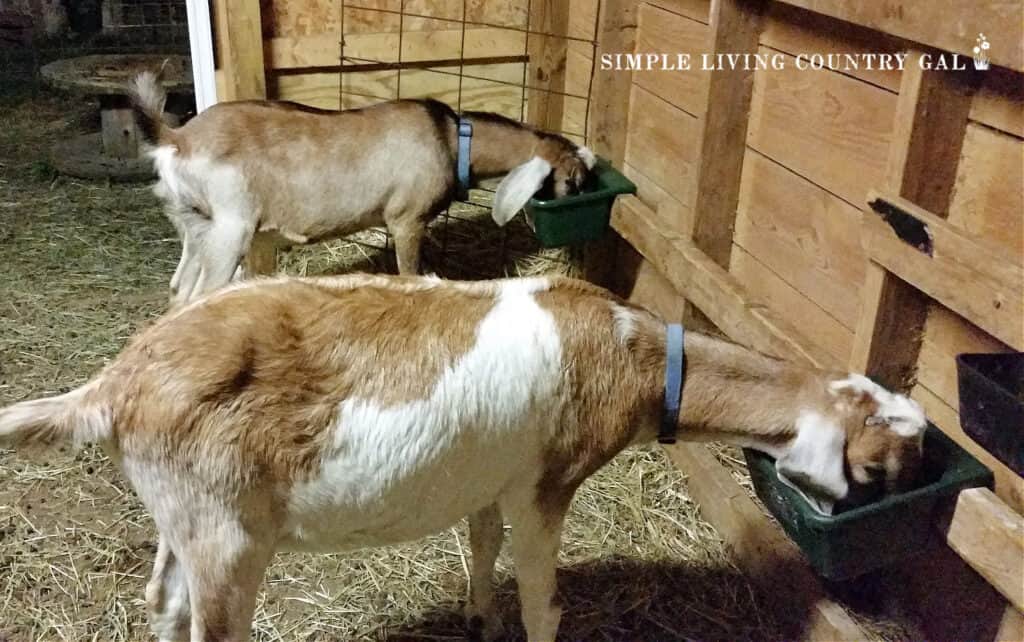
FINAL WORD
In most cases, a little shivering is fine…but too much indicates something may be up. Do your due diligence and watch for other signs that may signal an illness or injury.
Goats can absolutely thrive in frigid temperatures without artificial heat and be the better for it. I found out that first year, by warming my goats up, I was doing more harm than good. Now, I trust my goats to adapt to the colder temperatures naturally, and they are hardier, stronger, and healthier.
By allowing your goats to acclimate to the cold temps naturally, you might find that they will do well without any interference from us.

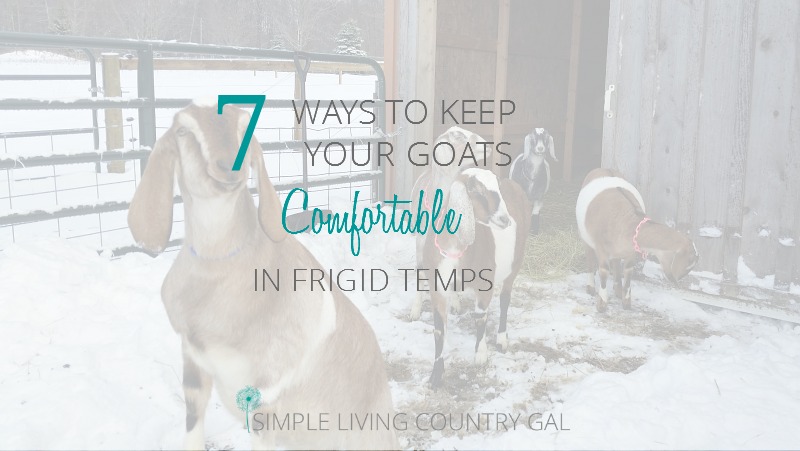











I would love to see a video of your goats playing! 🙂
Thanks Kari,
I’m working on it!!
Tracy Lynn
Thank you so much! I live in Colorado and have 2 goats. We bought a large rubbermaid plastic shed for them with a plastic floor and small skylights. We built a “bed” for them and nailed carpet on it. One sleeps on the bed and the other sleeps in the straw. I sprinkle barn stall absorbent product on the floor and then put straw on top of it. They have a 2 gallon heated water bucket. They have a manger with fresh grass hay to nibble on. On really cold nights I close the door. Neighbors say my goats are spoiled…….and I have to agree. Can’t imagine life without goats now. : )
Hi Peggy,
I loved reading about your goats. I believe all goats must be spoiled rotten and you are doing a great job! 🙂 They sound like they are nice and toasty warm.
Thanks for stopping buy!
Tracy Lynn
You say not to completely “seal” up the barn for air flow. Do you close your barn doors at night? Next week we (in Iowa) are expecting negative 20-30 below temps with windchill. Negative 10 for a high!! Should I close the barn doors for those kinds of temps?
Thank you
Hi, Donna,
Yes if it’s going to cold, wet and/or windy out I absolutely close up the barn. Today, it is 14 degrees yet sunny, so the barn is wide open and the goats are out getting a little sun in the snow. It really is quite amazing at the cold they can and will tolerate!
Good Luck!
Tracy
Great article…..we were -30 degrees two days ago with a -45 degree winchill (I live in Michigan’s Upper Peninsula) and I keep my goats in till around noon. Then I open the door and they can go in and out(same with the horses:) At least it has been sunny out:) I love winter…..it really makes you appreciate the other seasons:) Have a Happy Valentine’s Day
My daughter is laughing at me because I have a bed for my goats off the floor and put old blanket or towels and puppy pads on their bed and keep it dry and they just turned five weeks old.I am starting to take the pads off because they are trying to eat them now. I have two baby Nigerian goats and they were bottled feed and so spoiled they started sucking on my ears when they were a week old and still doing it.They come running when they see or hear me they are wetherlings and pets one is Butthead and the other is Little Britches.My daughter laughs and says mom they are baby goats not baby dogs ha!ha!
We had a single baby born in extreme temperature
. We brought her in warmed and bottle fed. Her mother would not accept her afterward. She has been in the house for 3 weeks. We do not have other babies to house her with. She really needs to move to the pasture but we are at a loss as to how this can happen. Any advise?
I am so glad you were able to intervene with your goat baby! I would bring her out with you any time you go out to do the chores. Allow her to be around the other goats while you supervise. Each time let her stay a bit longer until she is comfortable staying all day. Eventually, she will acclimate to life with the herd.
Good luck!
Tracy Lynn